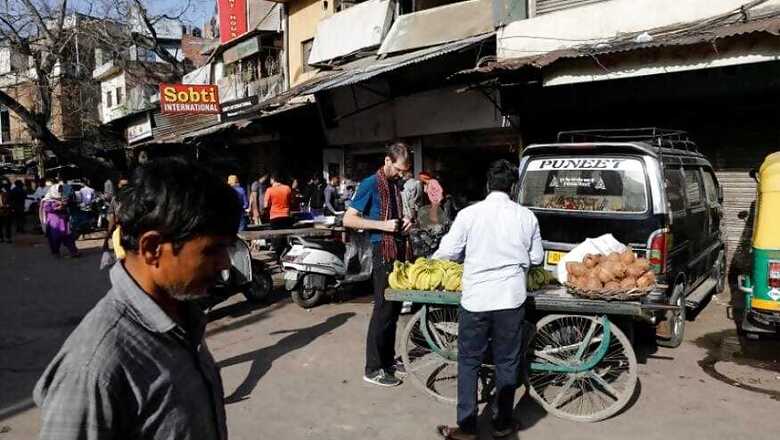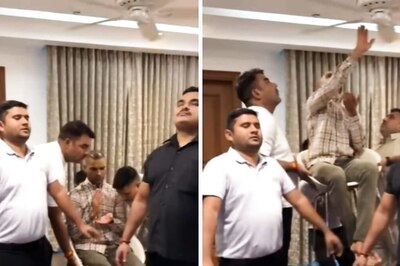
views
Bang on the Delhi-Uttar Pradesh border across Anand Vihar is a small quite colony – Kaushambi. The colony is home to multi-storey apartment towers that were built much before they came into vogue in Noida or, for that matter, in Gurugram. Several of these towers house quarters of officials of the Indian Revenue Service, SAIL, HPCL, public sector banks, Bureau of Indian Standards and such other prominent institutions, in addition to privately owned apartments and bungalows.
The township was in the news a few days ago when a COVID-19 positive case was detected in one of the towers and it has been in a lockdown ever since. Though next to Ghazipur vegetable and meat wholesale market, both are in short supply. The upmarket provision stores, which have been listed by the Uttar Pradesh administration as supply points, have not been able to bring much succor to, would not say starved, but definitely mentally harassed residents.
The misery was eased when a few good-old street vendors started making appearance with cartful of vegetables and fruits. The bread vendor is also holding the fort outside the colony’s Mother Dairy booth. In keeping with the Navratra spirit, a Bengali resident of the colony remarked them to be an incarnation of ‘Annapurna’ (Goddess of food). Another from a central police organisation was quick to say that the vendors were proving to be the last line of defence.
Such change of heart is welcome, given the fact that residents of the same colonies, especially their vigilante residents welfare associations, work overtime to “rid the colony of vendors.” To maintain the supply chain, now the local administration is allowing their ‘regulated’ appearance.
This is welcome as for the past few years, whenever the government decided to celebrate Mahatma Gandhi’s birthday as ‘Swachh Bharat Abhiyan’, batons came crashing on these vendors making them push the carts indoors and keeping the streets clean of all the ‘encroachers’. The Covid-19 lockdown should make administration give up this bias against the vendors, and spur the central and the state governments to implement Street Vendors Act piloted by the Manmohan Singh government and passed by the Parliament in 2014.
The implementation of this act has been slow, barring a few exceptions such as Odisha, where governance, under the visionary chief minister Naveen Patnaik, has seen many a first. The state has created dedicated vending zones and this has been done in consultation with the town vending committees (TVCs) consisting of the vendor representatives.
Not many chief ministers, including a ‘pro-people’ politician like Arvind Kejriwal, has shown such an initiative. Kejriwal, who came back to power by distributing freebies, announced the setting up of the TVCs only close to the polls, which is still to be implemented.
“To the police, the municipal officials and the governments, the law of the nation means little. The street vendors are still harassed and despite a Supreme Court order, most of state and municipal governments have not stirred to create vending zones,” says Arbind Singh, national coordinator of National Association of Street Vendors of India (NASVI), which has organised over 900 street vendors and hawkers associations to demand the right of livelihood for the vendors.
How are the street vendors functioning in these times of lockdown? As rightly pointed out earlier, this last line of defence was deployed by the government as the designated provision stores have so far failed to rise to the challenge. “Vegetables arrived nonstop at the mandis but there was none to pick as big buyers vanished because of the lockdown. If we were not allowed to pick, the veggies would have rotted,” says a vendor in the Kaushambi township dispensing vegetables wearing a protective headgear, gloves and the customary mask.
They have restored the supply chain by calling up their ‘loyal customers’, taking orders on phone and calling back when the pack is ready for pick with the amount to be paid. “The only change in our present supply chain is that the errand boys have been done away with as the towers are not allowing entry to outsiders,” says the vendor whom some are rightly comparing with Annapurna.
“Since survey of street vendors were completed in Uttar Pradesh some time back, its easy for the government to identify them and deploy them in Noida and Ghaziabad. On the contrary, no survey was done in Delhi, no vendor identified, so whom does the govt deploy,” adds Arbind Singh. The fear now being that using the crisis some of the cartels may usurp these vending passes.
The other state which has managed to deploy the chain of identified and licensed street vendors is Karnataka, especially in Bengaluru. Given the coronavirus lockdown experience, it could be the right time for the governments to overcome bureaucratic lethargy and fully integrate this last line of defence in the supply chain management.
(The writer is a senior journalist and political analyst)



















Comments
0 comment